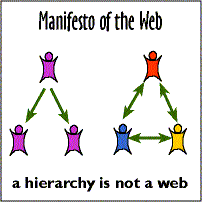
THE WEB and TRANSITIONMANAGEMENT
The Manifesto of the Web
 Networks of social interaction have existed ever since people have inhabited the earth. Whenever two or more people communicate for purposes of mutual benefit, they constitute a network of exchange. These networks of exchange, or webs, constitute the core building blocks of civilization. Networks of social interaction have existed ever since people have inhabited the earth. Whenever two or more people communicate for purposes of mutual benefit, they constitute a network of exchange. These networks of exchange, or webs, constitute the core building blocks of civilization.Webs are used to accomplish a variety of critical outcomes in social, economic, and political spheres. Social networks accomplish many basic human functions. The creation and maintenance of family is, of course, central to the role of this network. In the political domain, webs are used to manage the allocation of resources at an aggregate scale. The economic structure and meaning of webs is central to our work as we seek to understand how to effect organizational transformation. The economic basis for webs has evolved during the transition from an agricultural economy, to an industrial economy, and finally to the current economy which is based on information as the primary means of creating value. During the period when the industrial economy was the predominant feature of the economic landscape, the role of webs was neglected or ignored all together. Theories of industrial organization failed to take the essential role of social webs into consideration. Instead, they proposed organizational structures based on functional specialization. One's relationship to the means of production became a primary determinant of position and authority. In the information economy, the mode of production is based not on land (agriculture) nor on capital (industrial). Instead, it is based on intellectual capital which is primarily located within people and which, therefore, is a dynamic and mobile resource. It walks out the door at the end of the work shift. In a typical industrial-style organization the hierarchy of authority reduces the flow of ideas and thereby limits the creation and leverage of new intellectual capital. The hierarchy is concerned with command and control of resources and is driven by the understanding that value is created by the full utilization of capital equipment. During the past 30+ years we have been experiencing the transition from an industrial basis for value creation to one based on the contribution of individual knowledge workers. The service economy was the first wave of this transformation. Up until recently the issue of managing intellectual capital was only occasionally addressed and, then, as the problem of managing the white space in the organization. It is all that is not captured on the organization chart. As we move more fully into the middle and later stages of the information economy, the goal of value creation will be most effectively achieved by those who can harness knowledge resources. The web of human-based competencies will return to prominence as the model of production. Individuals who are not engaged in webs will be limited in their ability to contribute to the creation of value in an economy which is becoming increasingly web based. |
more on webs...
conditions | whyweb | manifesto | nomenclature |
Copyright © 1997 MG Taylor Corporation
copyrights, terms and conditions